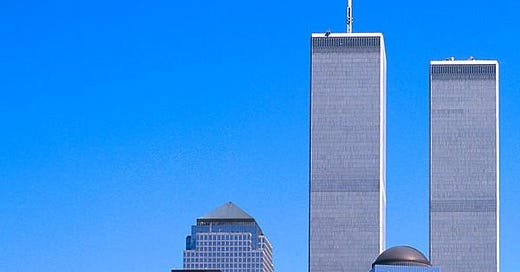Remembering 9/11: Yes, I Used to Be a Statist
But I Recovered From My Longtime Illness, Gradually and Then Suddenly

In The Sun Also Rises, by Ernest Hemingway, a character asks another how he went bankrupt. The answer: “Gradually and then suddenly.”
The famous four-word phrase has since become a way to describe much of the change that happens around and within us.
Gradually — incrementally; often imperceptibly within larger processes and without foreknowledge of where it will end up.
… and then …
Suddenly — no longer hidden; demanding one’s attention and acknowledgment of the significant change that occurred.
Last week, I wrote about the importance of open-mindedness and how it requires the possibility of adapting frameworks, not merely switching opinions. It’s not easy, and even when successfully done, it can take many years.
This week, I admit my own past failings and the changing mindset I underwent. How did I get over being a statist (one who assumes an official, imposed, hierarchical social structure to be necessary and maybe even good for human flourishing)?
I can’t pinpoint when my mindset finally shifted to the “and then suddenly” stage, but I know it was before the #COVIDHoax hit in 2020.
The “gradually” stage also likely began before I was fully aware of it. If I had to pick a date in hindsight, a good place to start would be exactly 23 years ago.
Sept. 11, 2001
By the time I reached adulthood and could form some quasi-reasonable political views, I was a small-government advocate, but a dutiful patriot and law-and-order guy within that classical liberal mindset.
I graduated college in 1997, and was fascinated and optimistic about the “balanced budget” at the federal level. I went to work in newsmedia, and technically lived in four states in a span of two years, the last being New Jersey.
By 2000, I was working as a layout editor and occasional copy editor for a mid-sized, regional daily newspaper, the Gannett-owned Courier-Post. Mainstream media, baby! Sure, I kept a critical eye on my own industry, but I was hopeful about its prospects.
George W. Bush won the famous/infamous “hanging chad” election that November. The executive editor trusted me with designing and detailing the front page.
Less than a year later, before smartphones and social media and with most internet still occurring without high-speed cable connections, I woke up on Tuesday, Sep. 11 — my work week began on Tuesdays — and went to the gym without turning on any news programs. After all, I worked for a newspaper; if anything important happened, I’d find out when I started my shift at 4 p.m.
I returned home to several messages on my answering machine. Could I get to work earlier? Um, not at this point, since I missed all the calls. I arrived near 4 p.m. to a newsroom that was even busier than it had been on election night. They put me on the front page for the Sep. 12 morning edition. I would have to integrate many people’s ideas and instructions to present a once-in-a-lifetime tragedy.

War, what is it good for? A sobering headline …
In the newsroom that evening and into the night, I was certain we were all witnessing the start of a war. My biggest contribution to the paper was arguing for “war” to be in the huge headline. The Courier-Post was one of a small minority of newspapers to lead with the word “war” on its front page.
And I have to admit: A significant part of me wanted the U.S. to go to war! I trusted “our leaders” and “our troops” to “do what was right” and vanquish “them” (whomever they were).
The unfolding War on Terror seemed plausible to someone who had also believed in the War on Drugs and hadn’t yet fully rejected the War on Poverty.
It would take the Great Recession and its ballooning-government aftermath for me to turn against the notion that government should interfere domestically.
Around the same time, my distaste for the Warfare State was beginning to rival my aversion to the Welfare State. There was no clear exit strategy for any of the post-9/11 military occupations, and as I learned about the War on Terror being used to violate Americans — thanks to Julian Assange (whom I wrote about here and here), Edward Snowden, etc. — there was less and less reason to defend any of it.
My “I Love America” had gone from naive, shallow, patriotic sincerity to disappointed sarcasm, as captured in this Alice Cooper song from decades earlier:
The events of 9/11 destroyed thousands of lives immediately and millions more in the War on Terror that followed. They also began destroying the pro-government mindset I harbored.
Today, I know that coercive civil authority is inherently, intrinsically evil. My mindset and value system point to being a good neighbor, not a good citizen.
I had realized the intellectual and moral bankruptcy of government the way Hemingway’s bankrupt character happened upon his severe circumstances: gradually and then suddenly.
Your thoughts …
I think I’ve shared more about my personal journey in this article than in any other; this isn’t my usual style of writing. As always, I’m interested in your responses, whether you agree or disagree, whether you find insights or find faults.
Is your anarchism/voluntarism in the “gradually” stage yet? Has it hit the “suddenly” stage? Do you remember what events or sequences of events spurred your personal movement?
Do you remember what you were doing on Sep. 11, 2001?
Should Alice Cooper’s “I Love America” be the new national anthem? (I’d resume standing for it, if it were!)
Anything else interest you about today’s theme?
Let me know in the Comments …
—
Find me on X: https://x.com/GoodNeighBadCit




Domenic-
Thank you for sharing how your mind was changed.
Having an open mind reminds me of Socrates, who said, “I am the wisest man alive, for I know one thing, that is that I know nothing.” Socrates knew that the human mind could error and had only limited ability. He welcomed dialog and had an open mind to improve his knowledge. We know how his life ended. Socrates was the ancient good neighbor and bad citizen.
My own journey from “gradually” began on July 21, 1993 and reached the “suddently” point on October 10, 1997. I knew even then, that Brett Kavanaugh would rise to become a Supreme Court Justice. Trump eventually placed Brett Kavanaugh on the Supreme Court in 2018. The story of my own journey is at my website FBIcover-up.com
By the time 9/11 arrived, I already knew that the official version reported by the news media was not true.
With my mind open I would see things that most people did not notice. Since you once worked for a Gannett newspaper, you may find an example from USA Today interesting. On July 20, 2004, USA Today reported that cell phones were successfully tested on passenger airplanes.
This was a contradiction because three years earlier on 9/11 the public was told that cell phone calls were made from the hijacked airliners. It is a principle of rational reasoning that a thing cannot be and not be at the same time. How could cell phone calls be made from airplanes on 9/11 when the technology did not exist?
On 9/11, I already knew that those cell phone calls never happened. One cell phone call was reported to have been made by a passenger locked in a restroom. Others must have known that this was not true, but our press and officials would stick to the official lies, just as they do today.
I flew on an airplane after 9/11 and noticed that the signal to make a call disappeared soon after takeoff, at about 500 feet. At that time calls would be dropped on an Amtrak train between Washington and New York, as the train passed between towns. Calls could not be made in the mountains of western Maryland where there were no cell towers. There were no cell towers in the sky, so no calls were made from planes in 2001.
The new technology in 2004 beamed cell calls from the plane to a satellite and then back down to the cell tower network on the ground. This technology did not exist in 2001.
See the USA Today article here.
https://x.com/HTurley6/status/1833876784330272819
Fantastic essay, Domenic. The official response to 9/11 was the point where I realized that the Republican Party was simply the right wing of a Uniparty vulture. That was a painful truth but it was necessary to endure in order to leave the safety of approved opinion and start thinking more independently. Sounds like you had a similar journey.